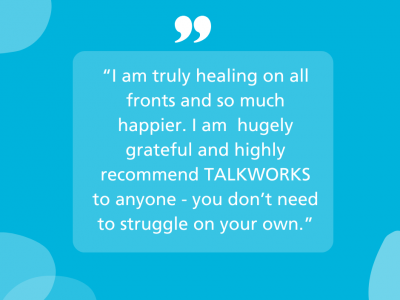- Home
- Anxiety
- Depression
- Emotional Eating
- Living With a Long Term Health Condition
- Loneliness
- Menopause
- Mindfulness
- OCD
- Panic Attacks
- Phobias
- Pregnancy & Parenthood
- Prolonged Grief (Grieving)
- PTSD
- Sleep Difficulties
- Stress
- Veterans mental health
- Needs We Can and Cannot Meet
- Cognitive Behavioural Therapy (CBT)
- Eye Movement Desensitisation & Reprocessing (EMDR)
- Employment Support
- Counselling for Depression
- Online Self-help
- Mindfulness
- Wellbeing Workshops
- Join the team
- Become a volunteer
- What to expect at your first appointment
- Testimonials
- Learn about mental health
- FAQs
- Mental Health Resources
- Blog
- Video Appointments
- Your feedback
- Making contact if you are deaf
- I need help now
Access support from TALKWORKS
Self-refer to TALKWORKSAccess support from TALKWORKS
Self-referWhat mental health support is available for new and expecting parents?
Perinatal Mental Health problems are those that occur during pregnancy and up to two years following the birth of a child. These can include difficulties sleeping, feeling tired and overwhelmed, or struggling to cope with increased stress and burnout.
Without support in this period, mental health issues can have a significant and long-lasting effect on the women, the child and the wider family. It’s important if you are struggling, to reach out to a friend or family member, or a service like TALKWORKS, Devon's NHS Talking Therapies Service, for support and to know that you are not alone.
How common are Perinatal Mental Health problems?
Discovering that you are pregnant and then welcoming a new child, is often seen as a time of celebration. However, a lot of new and expecting parents can experience difficulties during this period of change, with depression and anxiety being two of the most common mental health problems. According to NHS England, approximately 27% of new and expectant mums experience some form of perinatal mental illness – which is over 1 in 4 of us.
How can you tell if you are experiencing a Mental Health difficulty in the perinatal period?
During a period of pregnancy, or when you have just given birth, there are a lot of changes both physically and emotionally that are taking place. This can be an overwhelming time for some people.
In pregnancy the changes in hormones, sleep patterns and other physical changes can impact on the way that you think and feel about yourself. You may find that you are worrying more about the future, how you will manage as a new parent and whether you’ll be able to provide for your baby. This can lead to low mood, increased anxiety and feelings of worthlessness.
While we all know that welcoming a child can impact your sleep patterns, until you have a baby you can’t really comprehend just how tiring it really can be. You may find that you’re unable to do some of the activities you used to enjoy, such as going out with friends or taking part in your favourite exercise class, because of feeling exhausted or unable to find childcare.
It can be difficult to adjust to the period of change, and while you may feel isolated at times, it is important to remember that there is help available for new and expecting parents who are struggling during the perinatal period.
What support can TALKWORKS offer?
Our NHS therapists are trained to support new and expecting parents with a range of difficulties. To help remove any barriers to treatment, we endeavour to be flexible to help you access the support that you need. We offer therapy sessions either face to face, over the phone or by video call, and we can deliver therapy in the form of one to one sessions, group therapy, and online self-help support. Our aim as a talking therapy service is to give you the tools and techniques needed to get you back on track and feeling more like yourself again.
We know that reaching out for help, especially in the perinatal period can be hard, but it’s the first step to helping yourself to feel better again.
If you would like to book an assessment with TALKWORKS, you can complete a self-referral form online or speak to a member of the team by calling 0300 555 3344.
TALKWORKS is part of Devon Partnership NHS Trust, offering a free, confidential, service, part of NHS Talking Therapies, for people (aged 18+) in Devon (excluding Plymouth).
Related Posts

Sharon shares her story
Posted by Admin on 27 June, 2025

TALKWORKS staff member set to take part in the Baton of Hope tour
Posted by Admin on 13 June, 2025

